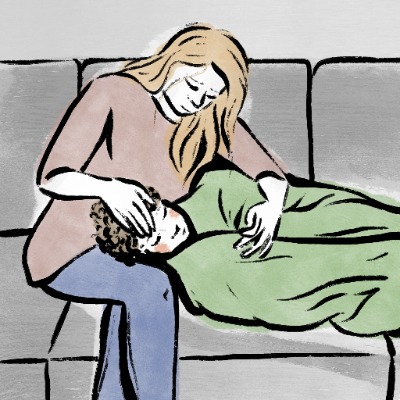
“Parenting in any context can be stressful, but it is all the more difficult when you have a child with inflammatory bowel disease (IBD),” shares Dr. Sara Ahola Kohut, a psychologist and health clinician scientist at The Hospital for Sick Children (SickKids) in Toronto. “Parents are balancing the needs of a chronic illness on top of the everyday needs of a family.”
Medications, appointments, hospital stays, difficult emotions, and specialized diets are a lot to balance. More than that, it is painful to witness someone you love go through so much. This can take a toll on parents and caregivers. For caregivers to continue giving care, sometimes they need to receive it. Dr. Kohut likens it to how, during in-flight safety demonstrations, we are told to put on our own masks before helping others.
Parents with sick children often do not think of themselves as a caregiver – they are caring for their child as any parent would. Yet with a sick child, this is the role they are thrust into as they navigate the health care system. As with all families, the wellbeing of parents and their children are inextricably related and these relationships are beginning to be captured in health research. A recent study out of SickKids shows that parenting stress is related to certain behaviours such as overprotectiveness that can negatively affect children’s quality of life. In the words of Dr. Kohut, “what parents do and how parents feel matter in a child’s life.”
Research on parents’ wellbeing
Earlier this year, a review paper was published in The Journal of Pediatrics, which summarized several studies on this topic and concluded that parents of chronically ill children generally experience poorer mental health. The findings from this study revealed a need for interventions that improve caregiver health outcomes. Through interventions such as the one offered by Dr. Kohut at SickKids and supported by Crohn’s and Colitis Canada, we are starting to see this need being met.
Research showing the relationship between parenting stress and children’s quality of life also reveals strategies that can help. More specifically, when parents show high levels of mindfulness, their stress no longer affects their child’s quality of life. To explore the applicability of this finding, Dr. Kohut is currently investigating how well an online mindfulness-based workshop can help support parents and improve quality of life for their child with IBD. Mindfulness techniques teach people to be in the present, rather than thinking of the past or worried about the future. In the context of Crohn’s or colitis, mindfulness could involve not focusing on how bad the last flare was or being anxious about what the next flare might look like.
Dr. Kohut is testing a program called iACT-P, an online workshop series on a type of mindfulness therapy called acceptance and commitment therapy (ACT). This program is designed to teach parents how to take care of their own health while managing their child’s IBD symptoms, medication, and diet. On the online platform, parents have the opportunity to connect with others and share their experiences, providing a space to talk about coping with a child’s illness.
Finding realistic strategies to teach mindfulness
Parents are busy – that’s the reality. Although many would like to practice mindfulness, it may be difficult to prioritize in relation to other priorities such as work, relationships, and their child’s health. Dr. Kohut is eager to create a therapy that is easy to practice and can be integrated into parents’ busy lives. She will evaluate whether the iACT-P program is realistic and helpful, and whether these workshops make tangible differences in parents’ stress levels, behaviours, and willingness to work with their child’s struggles.
Support from Crohn’s and Colitis Canada
Dr. Kohut is leading this project thanks to a Crohn’s and Colitis Canada Innovation in IBD Grant, which supports novel IBD research. It can be difficult for pediatric care settings to have the time or resources to always support parents in all the ways they would like to, which is why the iACT-P intervention is important. Not only does this program have the potential to improve the lives of the research participants, if successful, Dr. Kohut hopes it will be available at IBD centres across the country.
The iACT-P study is the second project of Dr. Kohut’s that Crohn’s and Colitis Canada has supported. The first is an ongoing study of the iPeer2Peer program, where young IBD patients are supported by veteran ones in a series of Skype conversations. Dr. Kohut’s aim is to see whether this program generates positive outcomes on quality of life, symptoms like anxiety and depression, and disease self-management skills. The iPeer2Peer program contributed to Dr. Kohut’s motivation for pursuing online interventions among parents.
Parents are a vital component of their child’s care and advocacy team. Supporting them is essential for supporting the quality of life for children living with IBD. Dr. Kohut shares, “Having mental health supports for parents is not only supportive for them but also has a trickle down effect for the person they’re looking after”.
Learn more about Dr. Kohut’s research on peer mentoring for youth with IBD.
Watch Dr. Kohut speak at our Gutsy Learning Series about using mindfulness therapy to help manage living with IBD.
Are you a researcher? Learn more about the Innovations in IBD Research grant.